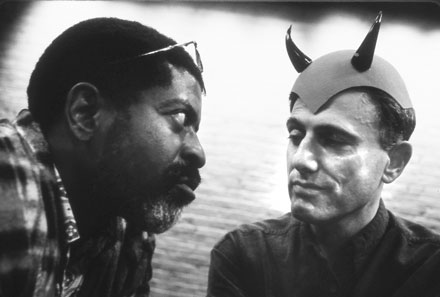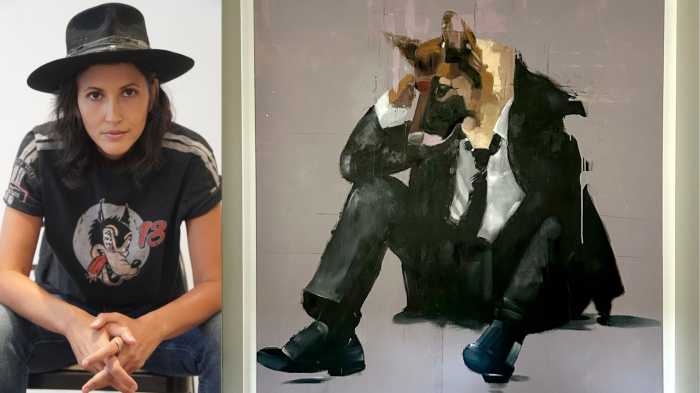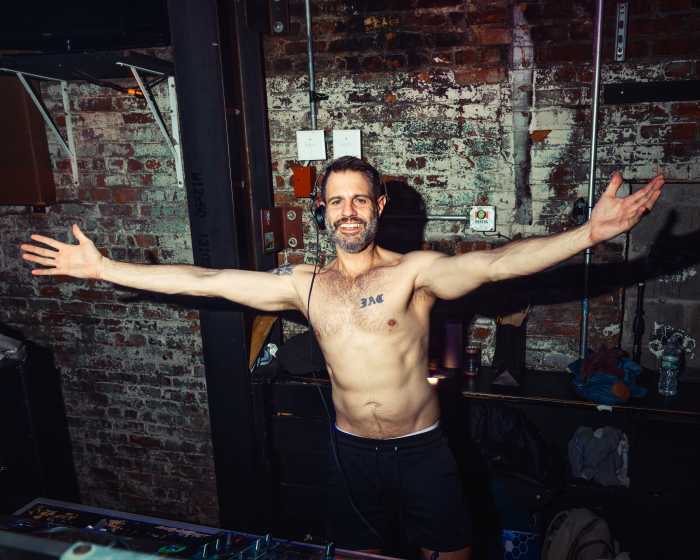By Davida Singer
According to translator Douglas Langworthy, in the world of German texts, taking on Goethe’s “Faust” is something like climbing Mount Everest. That’s why he jumped at the chance to do an adaptation of the masterpiece for Target Margin Theater. The play, titled “These Very Serious Jokes”, is directed by Target Margin’s artistic director, David Herskovits, and opens this week at HERE.
“Goethe’s original play was in two parts, 1200 lines of text,” explains Langworthy. “We’re doing it in two segments over the next two years, and hope to then produce it (with some cuts) at the end, in its entirety. How long? 18ish hours!”
Langworthy and Herskovits have collaborated since 1989 when the latter was still in Yale grad school, majoring in German. He’s since become dramaturge for the company, where he’s worked on everything from Shakespeare to Gertrude Stein, but German material is still his passion.
“A few years ago David was fishing around for a long term project, and I suggested “Faust,” Langworthy recalls. “I’d always wanted to translate it, and I think this is the best way to develop it over a long process. As a translator, I can work on it over time, rather than all at once. Goethe actually wrote this play over 60 years, starting in the late 1700’s until about 1832. I feel our production honors his long writing process. The early text was done when he was about 25, and then moves on. I call it ‘a play development run amok’ because early and later ideas are totally juxtaposed but in a very interesting way.”
“These Very Serious Jokes” goes from Faust in his study to his first brief meeting with Gretchen, the first romantic part of the piece. Struck by her beauty, Faust is determined to have her, and asks the devil, Mephistopheles, for help, the point at which Part I ends.
“This portion is about Faust’s spiritual quandary,” says Langworthy, “which leads him to the solution of a devil’s pact. The devil will tempt me, he declares, and if I’m ever satisfied, he will have my soul. Goethe’s isn’t a traditional story, but one he transformed into a bet with the devil. It goes on for 50 years, and Faust keeps struggling and growing until the end where he’s not damned, but really redeemed.”
The play includes a cast of 8, headed by David Greenspan, and Herskovits’ set resembling a very cluttered attic.
“Faust speaks early on of the cluttered life of his mind he wants to break out of,” Langworthy reports. “David’s got his own look here, and a detailed use of sound. Don’t come expecting period costumes, but the text is quite faithful. As a director, I think David has created a world open to multiple interpretations. He doesn’t boil it down, so the audience can come and pick what they want. That’s why I love working with him.”
The challenge has been in overcoming “the intimidation of translating this “Hamlet” of German literature”. Digging into it brought a second dilemma- the verse itself, which varies from scene to scene and Goethe’s constant use of rhyme, which Langworthy decided to break up.
“There’s a lot of magic in the work, which works well with rhyme,” he says, “and the language throughout is concrete and very rich. Ultimately, it’s been one of the great joys of my life as a translator. It’s one of those plays that contains so much. Especially in the Western world, in terms of our restlessness and striving – always searching for more – I think this piece will always be relevant. I hope people leave with the sense of joy of discovery, and of wanting to come back for the rest.”
And what about the title?
“It’s strange, yes,” Langworthy notes. “That’s why we chose it. It’s from a comment Goethe made on his deathbed to a friend, looking at the play and thinking about its production. He suggested approaching it with a playful spirit, not in a heavy-handed way. The idea of the play being “these very serious jokes” blows the dust off it a bit, and shows that Goethe was even able to laugh at himself. We can all use a bit of that.”
Read More: https://www.amny.com/news/







































